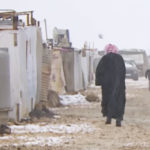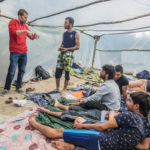Posted: 1/21/05
Sri Lankan sign asks, “Is there any hope for refugees like us?”
By Tony Cartledge
North Carolina Biblical Recorder
GALLE, Sri Lanka (ABP)—On the waterfront in Galle City, a road runs parallel to the beach, but there are no cabanas and beach chairs to be seen. Large, colorful shrimp boats lean together on the curb, ripped from their moorings and swept ashore by the infamous tsunami of Dec. 26. Across the street, a long city block has been turned to rubble.
A small Hindu shrine stands partly preserved amid mattress-sized chunks of broken concrete. Parts of two walls remain. Leaning against the broken roof is a crude hand-lettered sign painted on a scrap of plywood. In the swirling cursive script of Sinhalese, it asks, “Is there any hope for refugees like us?”
Behind the sign is an expanse of debris where many houses once stood. Thick concrete and cinderblock walls lie toppled and broken like a child’s Lego set that has been stepped on. A small boat sits near a mattress and a bicycle wheel. House numbers have been scribbled onto paper taped to bits of wall lying about, feeble reminders of where proud homes once stood.
| Baptists are helping providde clean water for tsunami survivors by cleaning wells like this on in Sri Lanka.(Photo by Tony Cartledge) |
A slim, brown woman picks through the flattened debris of her home. Her name is Weeregoda Mashashi Niluka Priyanthi. She and her husband were working at a nearby bus stand when the tsunami hit. Like hundreds of others, her husband was swept away by the giant waves.
Her daughter was at home but ran inland when the first wave came, and survived. Now every day mother and daughter return to the ruined spot where their home once stood, looking for salvageable items. They don’t know what else to do. Women’s shoes and broken dishes are visible, but the jewelry she seeks—worth 90,000 rupees or about $900—is not to be found.
Caught without his notebook, this reporter picks up a small rectangular piece of paper from the ground so he can write down her name. As he writes, she notices that the other side contains a faded picture, nearly washed out by the seawater. “That is my brother,” she says.
A 9.0 earthquake off the coast of Sumatra sent a tsunami speeding across the Indian Ocean on a beautiful, sunny morning after Christmas. An hour later, an estimated 30,000 Sri Lankans were dead, and thousands of homes were destroyed.
A. Fonsaka stands alone, staring silently at the calm blue waters, remembering the day when the sea raged. Fonsaka, like many Sri Lankans, initializes his surname. One’s given name is written last. His home also had been across the street. Now his broken fishing catamaran lies in two large pieces atop the flattened remains of his house. He wears a silver crucifix around his neck. He waits for someone to offer help.
A young man named Nimal, a member of a church in Galle, did not own a home, but the one he was renting washed away.
“I have no home, no clothes but these,” he says, fingering his worn knit shirt. “For the future, I have no income.” Stumbling for the words, he explains that his children can’t go to school because they no longer have the required uniforms.
North of Galle, in the fishing village of Dodanduwa, P. H. Piyarangth is eager to tell what has happened to him. He is a small, dark man with silvering hair and a gray moustache that makes him look older than his face does. In a gesture seen too often since the tsunami, he touches his fingertips to his chest, then holds his hands out, palms up, with a mournful expression. “I am a poor man,” he says. “My mother died. My house finished.”
“Come here,” he says, leading the way past two men making rafters from palm logs with a chain saw and a hand adz. Pausing amid piles of rubble and broken boats near the beach, he stops to point. “This was my mother’s house.” He says something else in Sinhalese. A bystander translates: “He said her house 300 years old.”
Piyarangth keeps walking, keeps pointing at mounds of debris punctuated by an occasional wall.
“This was my brother’s house.” Three walls of a single room remain. “This was my house.” He has stacked salvageable blocks and roofing tiles from the tangled remains. “This was my small brother’s house.” Closer to the ocean, there is no sign of where his younger brother lived.
His mother was washed out to sea when the tsunami came, he says. She could not run fast enough. Piyarangth found her body on the beach. She was one of nine from the village who died. Two were never found.
Piyarangth’s fishing catamaran lies just inland of the beach, broken into several pieces. He survived because of his experience with the sea, he said. As a fisherman, he recognized that the water level was dropping quickly, three hours before the expected low tide. Sensing trouble, he ran to get his family and take them to high ground where they “climbed up in a big house” and escaped the first giant wave.
He watched as the second wave covered his house. The third wave flattened its walls of cinderblocks and mortar.
It took almost 30 minutes for the water to recede after the last wave, and then bubbles kept popping from the ground, he said, mimicking the sound. “People were afraid the waves would come back.”
Further down the beach, a beloved puppy almost cost Asaththamby Weelu and his son their lives. When the first wave came, Weelu shouted so loudly that blood came from his mouth, he says. Weelu and his wife, Lakshumi Aryunan, took their children toward high ground. Remembering that they had left a puppy in the house, Weelu and the boy ran back to get it, and were caught in the second wave. Weelu put his son on his shoulders and they both held onto a concrete light pole until the waters receded enough that they could move inland. The puppy was saved.
Now, more than two weeks later, they sleep each night with relatives in Galle. During the day, they return to Dodanduwa and work at cleaning away the fragments of their former home.
Sarath Weerararttha is a tourist guide, proud that he speaks English and German as well as his native Tamil. “My house is finished,” he says. “My mother’s house is flat.” He points to an area that could have been bombed. “We are staying in the temple,” he says. He points to a small area where 26 houses once stood. They are no more.
Word has come from the Sri Lankan government that houses will no longer be built within 300 meters of the sea, leaving the newly homeless to wonder what they will do. They own no other land except what is in their village.
As a guide, Weerararttha is knowledgeable about Dodanduwa. He says there are 15,000 residents in the area, and 190 men and boys work as fishermen, sailing their catamarans several miles offshore in search of tuna and other fish.
But, even for those whose boats survived, there is no more fishing for now. The people refuse to eat fish for fear that the fish have eaten parts of dead bodies.
A boat, broken in half by the waves, sits beneath the palm trees. Carefully painted above a smiling fish are the words: “Sea is our life.”














We seek to connect God’s story and God’s people around the world. To learn more about God’s story, click here.
Send comments and feedback to Eric Black, our editor. For comments to be published, please specify “letter to the editor.” Maximum length for publication is 300 words.